- Bachelor Studies
- Universities and Programmes
- Eligibility
- Application Procedure
- German or English Medium
- Financials
- Living as a Student
- Working in Germany
- Get Guidance
- Download
Universities and Programmes
Germany has different types of universities. Take a look, so that you know which one would suit you the best. The difference lies in focus and courses that these universities offer.
How do I choose a university in Germany?
There are various kinds of universities in Germany. A majority of these belong to either of the following categories:
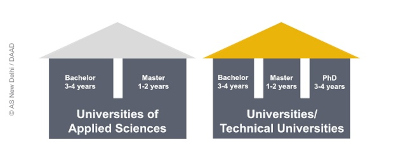
DAAD India
Universities and Universities of Technology (TU) are research-oriented. They offer a wide variety of subjects and can award doctorate degrees.
Universities of Applied Sciences (Hochschule für angewandte Wissenschaften – HAW/FH), on the other hand, are practice-oriented and offer courses mainly in engineering, business administration, social sciences and design. These have strong links to the industry and offer interesting possibilities such as joint supervision for your master thesis, where your professor and the company can together guide you .
HAWs do not award doctoral degrees, however as a master degree holder from a HAW, you are in principle eligible to apply for PhD at a university.
Your interest and inclination should define which of the two kinds of institutions you choose!
Which is the best university in Germany?
The German answer to this question is: There is no “best university”, neither in one subject and certainly not across all subjects.
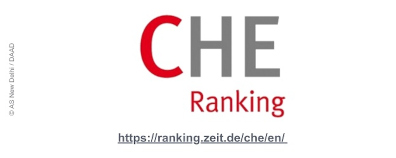
DAAD India CHE Ranking
Germany offers a multidimensional ranking, considering various criteria that are important from a student’s perspective. For example, student and staff judgments on quality of teaching, atmosphere at the university, library and other equipment, student numbers, average study duration, number of graduations, third party funding etc. This way you get a good picture of the strengths and weaknesses of each university on www.university-ranking.de Here you can find your programme by selecting a subject, a university or even a city in Germany!
What kind of Bachelor programmes does Germany offer?
Germany offers bachelor programmes in the fields of science, engineering, humanities and social sciences, management, arts, medicine etc. The courses start either in winter or summer semester depending up on the university. The duration is generally from 3 to 4 years as per the subject.
Around 300 courses are available in English medium and around 2000 courses in German medium.
A comprehensive database of all study programmes, in both German and English, is available on www.myguide.de.
Eligibility
It is always a good idea to check if the university’s requirements and your qualifications match. And then you can start with the application procedure.
Am I eligible to apply for a bachelors degree course?
Eligibility to a bachelor’s degree course in Germany depends on the higher education entrance qualification one has earned in the home country. In principle you are eligible to apply for a bachelor programme if you fulfil one of the following criteria:
- Completing IB, GCE or similar internationally recognised examination with the requisite subject combination
- Getting a rank in IIT Joint Entrance Examination (Advance) for admission to courses in technology and natural sciences
- Successful completion of one academic year at a higher education institution in home country in the relevant subject field
- Passing the qualification assessment examination in Germany, called Feststellungsprüfung.
In Germany, every university is autonomous. This means that every university/ study programme has its own set of criteria for admitting students. So please check the university website, and specifically the programme you are interested in to find out the exact admission requirements.
Application Procedure
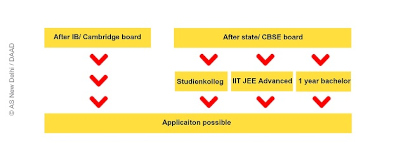
DAAD India
It is the eligibility that defines the steps in the application procedure. Find out where you need to apply.
How do I apply after an Indian/Bhutanese/Nepalese school leaving examination?
After a class 12 certificate from any of these boards, one cannot get a direct admission to a German university (the exception being a valid IIT-JEE Advanced result). For this, you need to complete a course in the Studienkolleg, take the the FSP (Feststellungspruefung), after which you can get a seat for a Bachelor degree programme.
How to prepare for FSP?
Studienkolleg or foundation/ bridge course helps foreign students prepare for the Feststellungsprüfung. On successfully passing this exam, which has a written and an oral component, you are eligible to apply for a bachelor’s degree course. Please remember that success in this examination does not automatically lead to an admission to a university or FH/ HAW, you need to apply for a university for admission.
How do I apply for a Studienkolleg?
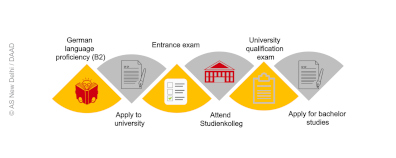
DAAD India
Depending on the degree programme or higher education institution of your choice, you can apply directly to the institution or via uni-assist.
The eligibility criteria to apply for enrolment in a Studienkolleg are a valid school leaving certificate (final board exam) with relevant subject fields and proficiency in German language (approx. B2 level based on the Common European Framework of Reference for Languages). Your subject knowledge and if applicable German language proficiency will be tested in an entrance exam (Aufnahmeprüfung) by the course coordinators before you enrol yourself in a foundation course.
Aufnahmeprüfung and Studienkolleg take place in Germany and so does the Festellungsprüfung.
What type of Studienkollegs are there and which one should I attend?
Studienkolleg is a full-time course with about 32 hours of instruction per week and usually takes up to two semesters to complete. There are different Studienkollegs meant for different subject fields and depend upon if one wants to study at a university or at a university of applied sciences.
Studienkollegs for studying at universities:
- M-course: Medical, biological and pharmaceutical degrees
- T-course: Mathematical, science or technical degrees
- W-course: Business, economic and social science degrees
- G-course: Humanity degrees or German studies
- S-course: Language degrees
Studienkollegs for studying at universities of applied sciences:
- TI-course: Technical and engineering degrees
- WW-course: Economics and business degrees
- GD-course: Design and art degrees
- SW-course: Social science degrees
In Germany, every university is autonomous. This means that every university / study programme has its own set of criteria for admitting students. It is important to check with the higher education institution of your choice to find out if the FSP of the Studienkolleg you want to attend will be accepted to avoid any potential problems.
How do I apply - after internationally recognised examination such as IB/GCE?
An IB diploma is generally recognised as a school-leaving certificate and offers either direct general university admission with a free choice of subject or subject-specific admission, depending on the subjects listed in the IB diploma. Read more
The “General Certificate of Education” (GCE) can lead to a direct but strictly subject-specific university entrance qualification in Germany. Read more
For German taught programmes higher level of German language proficiency may be required depending on the course and the university. Do connect with the university for more information.
How do I apply - with JEE ranking?
With JEE Advanced ranking you may apply directly to a German university for subject-specific course. For German taught programmes higher level of German language proficiency may be required depending on the course and the university.
Do connect with the university for more information.
How do I apply - after one year bachelors?
Completing one year of bachelors in home country may allow you for a subject-specific admission to a bachelor programme. For German taught programmes higher level of German language proficiency may be required depending on the course and the university.
Do connect with the university for more information.
German or English Medium
Germany offers education in German as well as in English medium. Depending up on the eligibility criteria to bachelor programme the language requirements vary.
Can I do my Bachelors completely in English medium?
Around 300 courses are available in English medium and around 2000 courses in German medium.
Most students from the region encompassing India, Bhutan, Nepal etc. need to go through the bridging course called Studienkolleg which necessitates fluency in German (approx. B1 level).
The number of Studienkollegs in English medium is low. Students attending these Studienkolleg need to apply for English taught bachelor programme which are also fewer in number than German taught programmes. (The Freshman Programme of FH Aachen, Foundation year of Jacobs university are examples of English taught Studienkolleg.)
Financials
While in a foreign country being able to manage your finances on your own is very important. You would need to plan your budget keeping your living expenses, travel costs and tuition fees if any.
Do I really not need to pay tuition fees?
In Germany, education is subsidised by the state and therefore state-funded institutions of higher education typically charge no tuition fee. So, in Germany virtually every student gets a scholarship!
Certain specialised courses and courses offered by private universities do attract fees. You will always frond information about the fees in the databases provided on this page and also on the university webpages and My Guide.
You will need to pay semester contribution of around Euro 300, depending upon the university and the services or benefits provided.
Studienkollegs at state-funded universities do not charge tuition fees.
What kind of budget should I have in my mind?
Apart from the tuition fees, if any, you will require about EUR 934 per month for subsistence i.e. housing, food, clothing, study material and other expenses such as health insurance and leisure activities. The precise split up for this amount will be updated soon.
The amounts can vary from city to city, and of course from lifestyle to lifestyle!
The following table shows the split up at the time of the last budget indicated in 2019.
| Rent and utilities | EUR 332 |
| Food and Drink | EUR 154 |
| Clothing | EUR 48 |
| Learning Materials | EUR 24 |
| Car and Public Transportation | EUR 116 |
| Health Insurance, Medical Costs, Medicine | EUR 96 |
| Telephone, Internet, TV | EUR 32 |
| Recreation, Culture, Sports | EUR 66 |
| Total | EUR 867 |
Source: German Student Union (Deutsches Studentenwerk), 2019
Living as a Student
Living on your own comes with lots of responsibilities, at the same time it can also be very interesting. It starts with finding a place to stay, learning how to cook, shopping on a budget, making friends and connections. Hope this section helps you with some of your questions.
How do I find an accommodation?
Germany offers various types of accommodations:
- Students hall of residence: Here you can rent rooms provided by Student Services Organisation (Studentenwerk). They are low in cost and preferred by many students. Studentenwerk also provides specially designed Service Kits for international students. Get in touch with Studentenwerk of your city know more.
- Shared Flats (Wohngemeinschaft – WG): Shared flat or WG is another affordable accommodation, where you have your own room in a flat and share the kitchen and the bathroom with other flatmates. Living in a shared flat is cheaper as the rent and other expenses get shared. You can find advertisements for vacancies in WGs online on social media groups or on student-friendly websites.
- Private apartments: If you prefer living alone, private apartments can be an option for you. You can find them with the help of Studentenwerk, on boards in the university foyer or even on social media groups and websites for rental real estate.
Make sure to be on the lookout from early on, so that you find the best place at an affordable price.
Which is the best university in Germany?
The German answer to this question is: There is no “best university”, neither in one subject and certainly not across all subjects.

DAAD India CHE Ranking
Germany offers a multidimensional ranking, considering various criteria that are important from a student’s perspective. For example, student and staff judgments on quality of teaching, atmosphere at the university, library and other equipment, student numbers, average study duration, number of graduations, third party funding etc. This way you get a good picture of the strengths and weaknesses of each university on www.university-ranking.de Here you can find your programme by selecting a subject, a university or even a city in Germany!
Working in Germany
You can of course work in Germany as long as you respect the regulations, which are not complex and are fairly easy to understand and follow.
Can I work in Germany as a student?
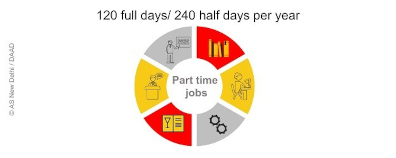
DAAD India
As an international student, you are permitted to work for 120 full days or 240 half days in a year. This will help you in getting a bit of extra pocket-money!
What kind of Bachelor programmes does Germany offer?
Germany offers bachelor programmes in the fields of science, engineering, humanities and social sciences, management, arts, medicine etc. The courses start either in winter or summer semester depending up on the university. The duration is generally from 3 to 4 years as per the subject.
Around 300 courses are available in English medium and around 2000 courses in German medium.
A comprehensive database of all study programmes, in both German and English, is available on www.myguide.de.
Am I eligible to apply for a bachelors degree course?
Eligibility to a bachelor’s degree course in Germany depends on the higher education entrance qualification one has earned in the home country. In principle you are eligible to apply for a bachelor programme if you fulfil one of the following criteria:
- Completing IB, GCE or similar internationally recognised examination with the requisite subject combination
- Getting a rank in IIT Joint Entrance Examination (Advance) for admission to courses in technology and natural sciences
- Successful completion of one academic year at a higher education institution in home country in the relevant subject field
- Passing the qualification assessment examination in Germany, called Feststellungsprüfung.
In Germany, every university is autonomous. This means that every university/ study programme has its own set of criteria for admitting students. So please check the university website, and specifically the programme you are interested in to find out the exact admission requirements.
Get Guidance
Whether you are in India, Nepal or Bhutan, the DAAD is there to help you with your study in Germany plans. Check out how you can reach us!
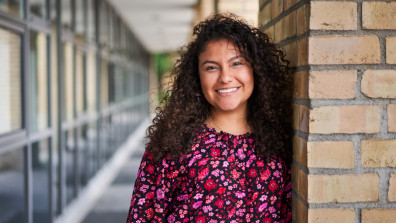
DAAD/von Allwörden
My GUIDE
Find your way through the richness of German study programmes. Based on your academic background and interests, My GUIDE will find suitable study programmes for you. Check your entrance qualification and contact your favourite university.
Visit My GUIDE

DAAD ASND
Individual Appointments
You can connect with the DAAD offices in Bengaluru, Chennai, New Delhi and Pune or meet Team DAAD online!

iStockphoto
Information Sessions
The DAAD offers free of cost information session about studying in Germany regularly. Check which dates and topics suit you, register and join!
Click here for dates, timings and registration links: www.daad.in/events.